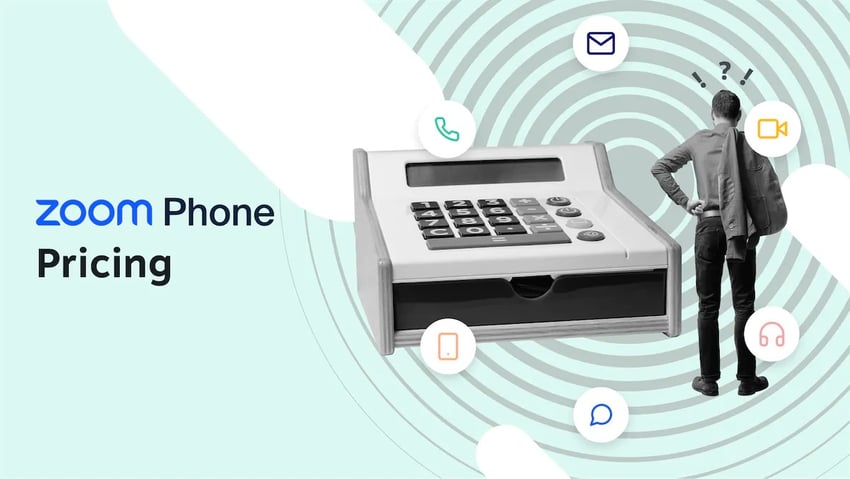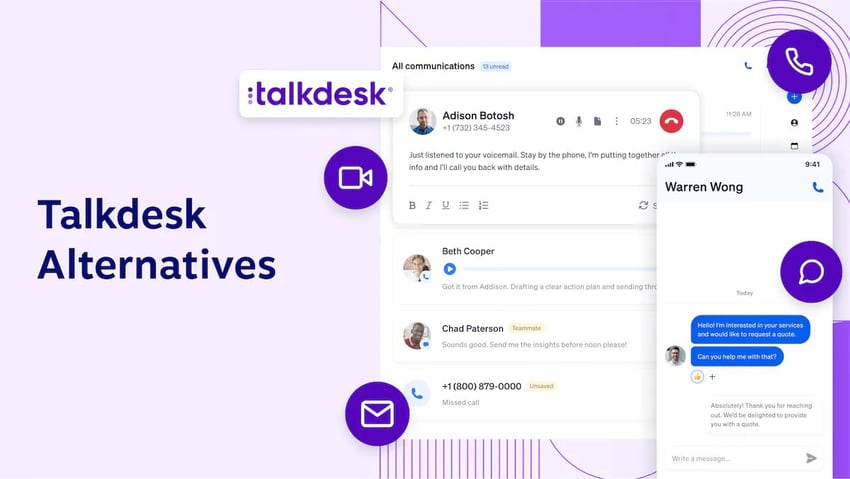In the past, call centers required substantial investments in hardware and software, as well as complex maintenance, and agents were tied to physical workspaces with limited flexibility.
But today, hosted contact centers overcome these challenges by delivering essential omnichannel support tools through the cloud on a subscription basis.
A hosted model allows companies, from enterprise to small business, to scale operations up or down as needed without capacity restraints. Agents can work productively from anywhere and management gains robust analytics and automation to drive efficiency.
In this article, we’ll explain how a hosted contact center works, explore the benefits, and share tips to choose the right hosted contact center solution.
What Is a Hosted Contact Center?
A hosted contact center is a contact center that’s housed offsite by a third-party provider and accessed remotely. It eliminates the need to install on-premises hardware and software. Instead, you access key contact center tools and features through a secure cloud service.
Think of it as renting a fully equipped contact center in the cloud, ready to use whenever you need it

Customers now demand omnichannel support and expect to reach you on their preferred platform (phone, email, social media, or even messaging apps), and hosted contact centers empower businesses to meet these demands effortlessly.
Hosted Contact Center vs Cloud Contact Center
The terms “hosted contact center” and “cloud contact center” are often used interchangeably. However, there’s a slight difference.
Hosted contact center can refer to any contact center software or solution hosted by a third-party provider, whether it’s hosted in a traditional data center or the cloud. It’s different than a traditional hosted call center as it covers many types of communication rather than just voice calls.
Cloud contact center specifically refers to a contact center solution hosted in the cloud. Cloud-based contact centers offer all the benefits of hosted contact centers, with the additional advantages of scalability, security, and accessibility.
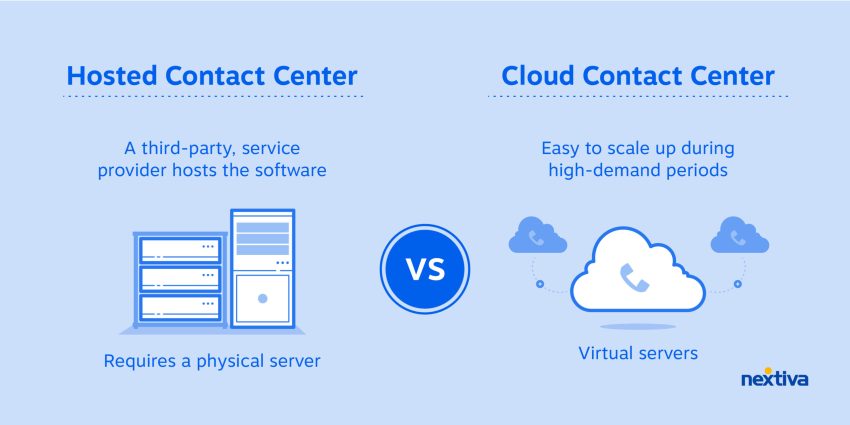
And it’s worth noting that a virtual contact center is used by a remote workforce that leverages cloud-based technology to provide flexibility and cost-effectiveness while managing customer interactions across multiple channels.
Hosted Contact Center vs Hosted Call Center
One last differentiation. Although these terms are also often used interchangeably, a hosted call center is not exactly the same as a hosted contact center. Here are the main differences:
- Channel Coverage: Hosted contact centers support multiple communication channels, whereas hosted call centers are primarily voice-focused.
- Features and Integration: Hosted contact centers offer more advanced features and integrations with other business systems compared to a hosted call center solution.
- Use Cases: Hosted contact centers are suitable for businesses looking for a hosted unified communication solution to manage any type of customer interaction, while hosted call centers are ideal for organizations that mainly need to handle phone calls.
How a Hosted Contact Center Works
A hosted contact center outsources your customer communication infrastructure to a third-party service provider. So instead of owning and maintaining your own hardware and software, you rent access to it from the provider’s secure data center or cloud platform.
Here’s what you need to run a hosted service:
- Infrastructure: The contact center infrastructure, such as servers, software and telephony, is hosted by the vendor in the cloud. This eliminates the need to invest in on-premise hardware or software.
- Agents: Agents use softphones on their computers to receive and make calls, rather than traditional desk phones. They can be located anywhere with internet access rather than in a centralized contact center.
- Routing: Incoming calls are routed to available agents using the vendor’s call routing algorithms and automatic call distribution (ACD) software. Routing rules take factors like skills, availability, and priority into account.
- Applications: Agents access the contact center applications through web browsers. This includes phone controls, CRM integration, ticketing, knowledge management, chat interfaces, and data dashboards/reporting.
- Administration: The vendor handles infrastructure, application, and backup administration and management. Businesses can self-administer at the agent, call flow, and reporting level through web interfaces.
- Scalability: Cloud contact center platforms can scale up or down easier than on-premise allowing flexibility to handle call fluctuations. Businesses only pay for what they use. This makes them a smart option for companies exploring alternatives to Convoso Contact Center, especially those seeking cost efficiency and agility.
- Disaster recovery: Business continuity is built-in as the infrastructure is distributed rather than centralized on-premise.
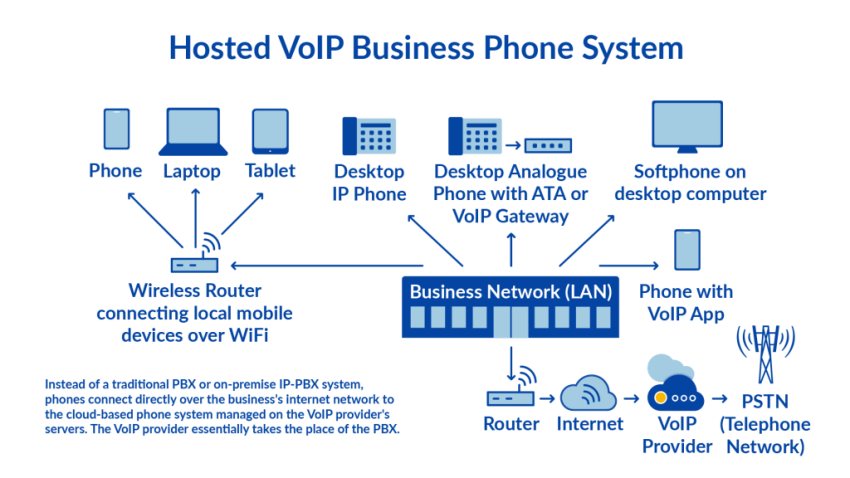
The vendor hosts the platform offsite while the business manages the agents, call routing strategies, and reporting through easy-to-use web interfaces. This provides businesses with more flexibility and time to focus on customers.
Benefits of a Hosted Contact Center
Hosted service providers offer the latest contact center technology at an affordable price point for even small and midsize businesses. Hosted contact center software offers powerful benefits compared to traditional on-premise call center software, such as the following.
1. Contact center virtualization
The days of a busy, noisy contact center in a single physical location are long gone.
Hosted contact centers use the cloud rather than relying on physical infrastructure and copper wires. Your agents can access their workstations from anywhere with an internet connection.
This makes them extremely flexible, facilitating remote work and supporting agents on the go.
2. Better visibility into contact center metrics
Modern hosted contact center features are designed for handling high call volumes across distributed teams, and include:
- Call queues to efficiently route and manage incoming calls
- Call recording, monitoring, and whisper capabilities
- Real-time agent dashboard showing availability status
- Easy ad-hoc and scheduled call transferring
- Built-in team chat and collaboration
Supervisors gain better visibility into contact center KPIs like handle time, abandonment rate, and first call resolution to optimize operations.
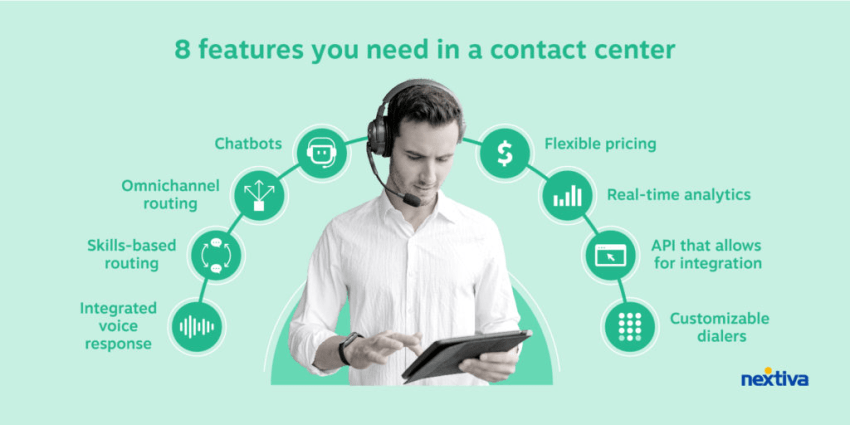
Supervisors gain better visibility into contact center KPIs like handle time, abandonment rate, and first call resolution to optimize operations.
3. More personalized customer experiences
Hosted contact centers simplify integration using APIs. This includes connecting your phone system to CRM platforms like Salesforce to bring up customer records automatically on incoming calls.
With the context of past interactions and purchases, agents can deliver more personalized and satisfying experiences. Integrations centralize data across systems for a single source of truth.
4. Efficient segmentation of voice traffic
Interactive voice response (IVR) provides automated self-service options to customers using voice prompts or natural language interfaces. This deflects common inquiries away from live agents.
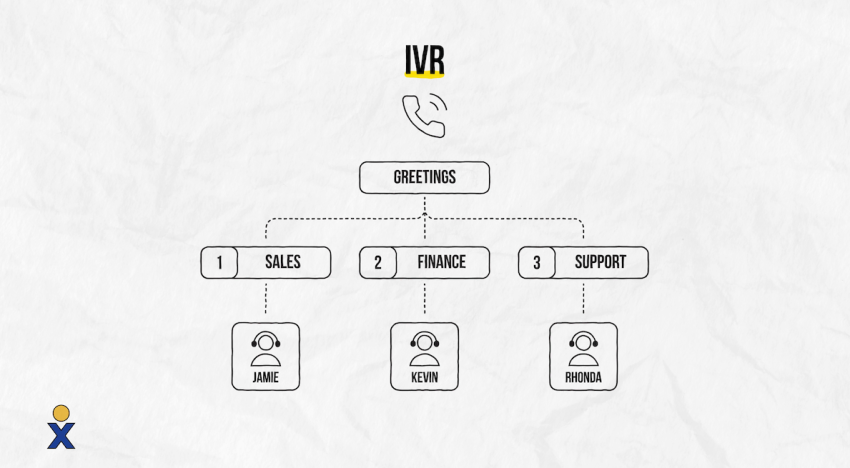
Intelligent call routing assigns callers to agents based on configurable rules and criteria. For example, Spanish speakers could be routed to bilingual agents.
These capabilities allow efficient segmentation of voice traffic to drive faster responses and higher satisfaction.
5. Cost efficiency and scalability
The total cost of ownership and ROI of a hosted contact center is far more attractive compared to legacy on-premise systems requiring costly hardware and maintenance:
- No upfront infrastructure/equipment costs
- Usage-based pricing that flexes with demand
- Built-in redundancy and failover
- Effortless scalability for seasonal peaks
- Access to the latest software updates and features
6. Actionable reporting and analytics
Robust reporting provides visibility into contact center performance and trends over time:
- Traffic volume patterns
- The average speed of answer
- Handle time distribution
- First-call resolution (FCR) rates
- Customer satisfaction (CSAT) metrics
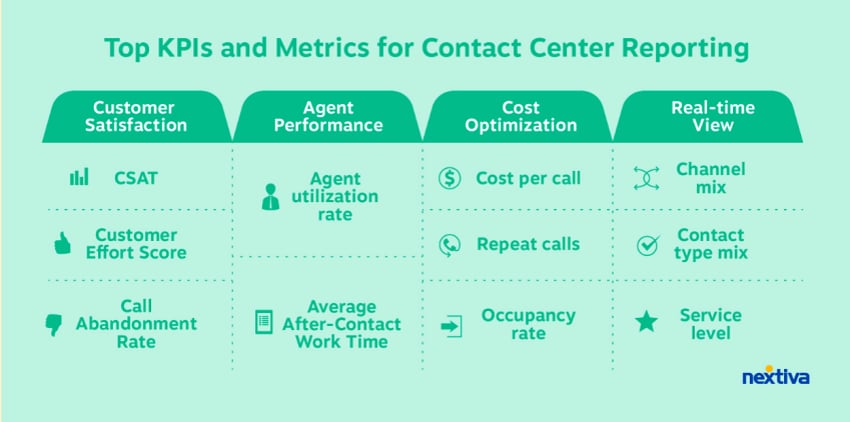
These insights guide operational changes to enhance efficiency while improving the customer experience.
7. More precise outbound calling campaigns
Hosted contact centers can efficiently orchestrate outbound calls to specified leads or contact lists.
After auto-dialing numbers, qualified leads get connected directly with available agents. This automates previously manual and repetitive dialing tasks, allowing agents to have more productive conversations.
Today’s feature-rich hosted contact centers empower distributed teams to deliver superior, scalable customer experiences across both inbound and outbound interactions and drive better agent performance.
Who Should Consider a Hosted Contact Center?
Hosted contact centers work best for businesses that need omnichannel support.
Modern hosted platforms handle not just phone calls, but also emails, chats, social media messages, and even video conferencing, enabling you to offer seamless customer service across all channels.
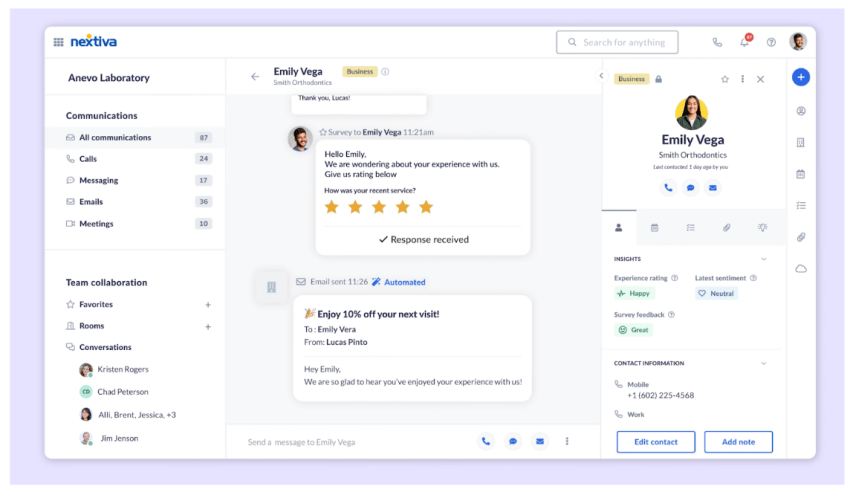
If you’re seeking new features and faster innovation, cloud-based providers are a great idea because they constantly update their platforms with new features and functionalities. In other words, with a hosted solution, you automatically benefit from these updates without additional investments.
And if you need advanced contact center features but your resources are limited, hosted cloud contact center solutions can provide sophisticated capabilities without large hardware investments or IT headcount.
The ability to scale and pay only for what you use makes it financially appealing to many smaller organizations. Startup companies can get up and running quickly without large upfront costs and easily manage fluctuating customer interactions.
Choosing the Right Hosted Contact Center Provider

Ready to choose your contact center technology? You might come across some challenges and constraints related to pricing, compliance issues, security, and functionalities when selecting a hosted contact center.
So to make your choice easier, here are a few key factors to consider.
Pricing models and total cost of ownership
Look beyond just the monthly fees or upfront costs. Make sure to factor in any additional charges for integrations, storage, support, training, etc.
Plus, be sure to understand the full cost of ownership over the lifespan of the technology. Some providers offer usage-based pricing which can scale up or down as your needs change.
Security measures and compliance standards
When reviewing contact center vendors, ask about their policies and procedures to protect your data. This can include a disaster recovery plan, redundant data centers, 24/7 monitoring, and real-time network status updates.
Additionally, check each provider’s certificates and compliance with regulations, including GDPR, PCI, SOC 2, ISO/IEC 27001, and any certificates relevant to your industry such as HIPAA.
Features, integrations, and configurability
List the features that are non-negotiable for your business communication. Then look for an integrated omnichannel approach to manage all your communication channels and expand to new ones if you need to. Otherwise, you might have to switch to a different provider once your needs grow.
Be sure to make the most of automation and intelligent routing with IVR, automatic phone call distribution, and predictive dialers. This way, you’ll maximize agent efficiency and make your workforce management (WFM) easier.
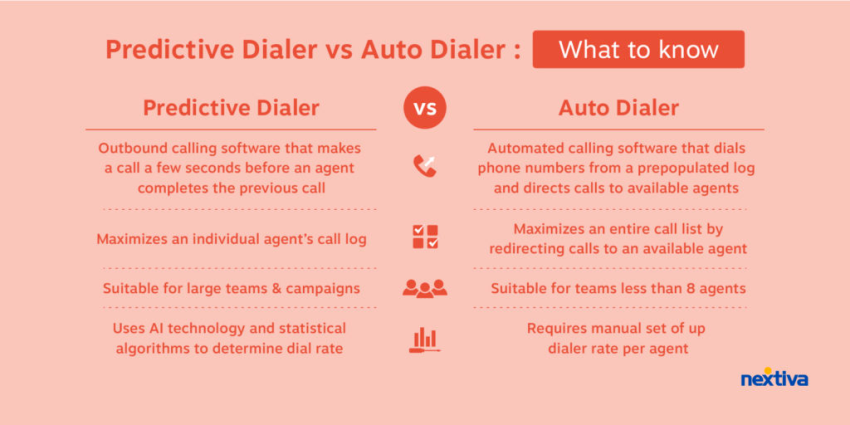
Analyze each provider’s features to double-check they offer everything you need. Consider reliability and uptime guarantees, options for geographic redundancy, and scalability add-ons.
Bots and AI-based automation
Bots and automation are here to stay. AI-based automation is the perfect match with the growing number of digital channels your customers use. With conversational AI, you can get your system to learn from each interaction and:
- Reduce hold time
- Solve customer service issues faster
- Steer calls the right agents every time
- Increase customer satisfaction

Customer experience and agent experience
Your software solution isn’t just about your customers, but also about your agents — and these depend on each other. Customers feel that an agent’s experience impacts their customer experience, and agents feel that technology plays a key role in this, a Global Contact Center Survey from Cisco revealed.
It’s essential to consider your agents’ needs and experience when choosing your contact center solution. Agents are on the frontlines with your customers, and how you equip them matters.
Empower your agents with an easy-to-use but powerful interface and maximize their focus time by minimizing distractions and repetitive work.
Set Up a Flexible Contact Center Solution
Implementing and managing a hosted contact center is key to driving better adoption, agent performance, and customer experience.
When setting up a contact center solution, make sure to:
- Choose a hosted provider and assess features, reliability, costs
- Plan channels, routing, IVR, desktop tools, CRM integrations
- Implement and conduct thorough testing
- Train supervisors, and agents on systems and policies
- Launch the contact center and closely monitor the performance
- Manage operations with analytics and quality reviews
- Continuously improve with customer/agent feedback
The best part about cloud-based communication solutions is that they’re flexible and scalable based on how your business evolves.
If you want to take more customer calls and monitor your call flow better, consider a contact center. You’ll be able to automate multi-channel customer support and build self-service options so your customers always feel taken care of, no matter how busy you get.
Nextiva’s Hosted Contact Center Solution
A hosted contact center is a powerful solution that offers numerous benefits, including cost savings, scalability, enhanced customer experience, and robust security. And by using advanced features such as multichannel support, AI-driven tools, and real-time analytics, businesses can significantly improve their customer service operations while maintaining flexibility.
If you’re considering implementing a hosted contact center, it’s important to choose a provider that aligns with your specific needs and goals. Nextiva delivers comprehensive hosted contact center solutions that can help your business stay competitive and responsive to customer needs.
Making the switch to a hosted contact center could be the transformative step your business needs to enhance customer satisfaction and drive growth.
Related: Contact Center Architecture: How Contact Centers Work
The cloud phone system built for remote teams.
Get a hosted VoIP system with superpowers. Get Nextiva.
Hosted Contact Center FAQs
A hosted contact center is a customer service platform that is hosted and managed by a third-party service provider. This provider owns the infrastructure and software necessary for the contact center’s operations and delivers these services over the internet.
Companies use hosted contact centers to handle customer interactions through various channels like phone, email, chat, and social media without needing to maintain the underlying hardware or software themselves.
A hosted call center is similar to a hosted contact center, except it focuses on just voice-based interactions, such as inbound and outbound phone calls.
A cloud-based contact center is a modern customer service solution that uses cloud computing technology to operate a contact center. It allows businesses to handle customer interactions via the internet and includes features such as scalability, flexibility, and remote access.
With a cloud-based contact center, companies can quickly adapt to changing demands, integrate with other cloud services, and provide a seamless experience across multiple communication channels.
The terms “cloud contact center” and “hosted contact center” are often used interchangeably, but there are subtle differences:
Cloud Contact Center Solution: This refers to a contact center that is entirely hosted in the cloud. It is designed to be scalable, flexible, and accessible from anywhere with an internet connection. The infrastructure is managed by the service provider, and updates or maintenance are handled seamlessly in the cloud environment.
Hosted Contact Center Solution: While similar to a cloud contact center, a hosted contact center can be seen as a step towards cloud services. It involves outsourcing the hosting of the contact center’s infrastructure to a third party, but it might not offer the same level of scalability or flexibility as a fully cloud-based solution. It often uses dedicated servers rather than the dynamic, shared resources typical of cloud computing.

















 VoIP
VoIP 













